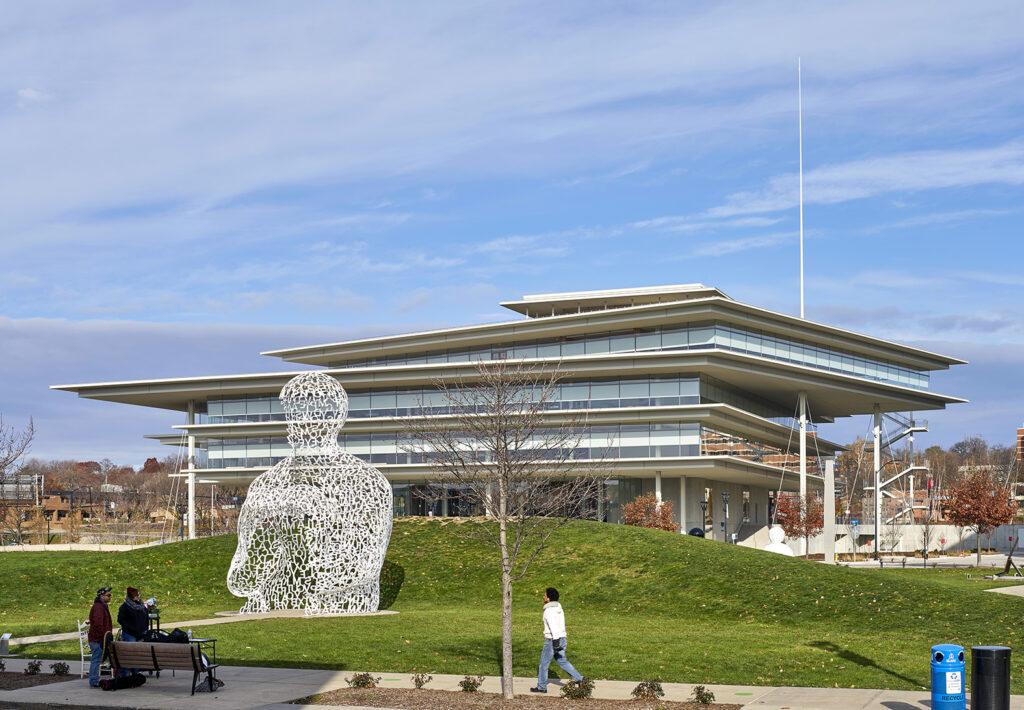Fretting the internet

KENT DARR Nov 28, 2017 | 5:32 pm
8 min read time
1,965 wordsAll Latest News, Business Record Insider, Real Estate and Development, Retail and BusinessWith few exceptions, retail is trending hot and cold in Greater Des Moines, or, as developer Mike Whalen describes it, the industry is a little “schizo” right now.
Outlets of Des Moines, a development Whalen sought for the Prairie Crossing district in Altoona, is grabbing lots of attention these days, with the hope that it will serve as a beacon for a healthy regional retail market.
Most commercial real estate brokers and developers who specialize in retail will tell you that, locally, the industry is healthy, just slow to make a decision. This time last year, there were an estimated 40 or so retail projects — new construction, makeovers of existing centers — in the offing. Some were speculative and fizzled over the course of the year; others are being built right now.
“The overall sense I am getting is that several groups are hitting the pause button right now,” said Tyler Dingel, a retail specialist with CBRE|Hubbell Commercial. “The flurry of activity we saw in the spring was mainly speculative with few groups moving forward without securing their anchor tenants. This is a critical time of the year for many retailers, and holiday sales will direct the next phase of store openings and closings. There is still major concern as to when the next shoe will drop with some of the big box national groups. Most of these groups come as no surprise as they have been on life support for some time.”
Many retailers are intimidated by the growth of online retailers, but the strength of e-commerce could be overblown, especially in Greater Des Moines.
“A small fraction of sales occurs on the internet,” said Richard Hurd, founder of Hurd Real Estate Services. “Here, it is negligible.”
National data show that though online sales grab a larger share of the retail market every year, it’s still a small share. Through the second quarter of the year, e-commerce accounted for about 9 percent of total sales, up 16 percent from the year-ago quarter, according to the U.S. Census Bureau. For all of 2016, online sales accounted for nearly 12 percent of all sales.
Hurd is one of the developers who have mixed-use projects underway. He is working out the details for construction of a Hobby Lobby. He is also developing the Parkways at Jordan Creek and Mills Civic parkways. A short distance east, Hurd is entertaining potential tenants for a space once occupied by Fresh Market, the grocer that was shuttered at Hurd’s Mills Crossing development after it was acquired by a private equity firm.
He isn’t too worried about filling the space, saying, “We’ll get there.”
At Jordan Creek Parkway and Bridgewood Boulevard, the framework of another retail center is going up under the direction of Signature Real Estate Services. Just north of that development, in Ryan Cos. US Inc.’s Jordan West development, a Slumberland store is under construction.
Beyond Jordan Creek
It’s no secret that retailers are still being drawn to West Des Moines, especially the Jordan Creek Town Center area. Still, there are other retail centers east of that consumer magnet that continue renovations. The Colorado owners of Clocktower Square near 28th Street and University Avenue continue to reshape its look and attract tenants, such as a Fresh Thyme organic grocery store that was able to open last year after a long search for workers. Just east across 28th, Elwell Co. has renovated Governor Square.
To the casual observer, it would appear that Buyers Realty Inc.’s Water Tower Place in West Des Moines, home to Whole Foods, Best Buy and a range of national names, rarely has a vacant space.
And then there is the Prairie Trail mixed-use development in Ankeny, which seems to defy the adage that every retail center needs a big-name anchor. Its range of entertainment, shopping and dining establishments also serves a unique purpose — providing a recruiting incentive for businesses that have found office space in its retail-oriented center, called the District.
“We’ve been pleasantly surprised with the success of second-floor office space over retail,” said Marcus Pitts, executive vice president with international broker JLL’s Iowa office. “Employees love it that their office is next door to a brewery or across the street from Fong’s. There’s a lot there for them to do. Employers see Prairie Trail as an amenity package that they can offer.”
Across Greater Des Moines, retail vacancies were a relatively low 5.5 percent at the end of the third quarter, up slightly from a year ago, according to a report from real estate analytics firm Xceligent Inc. New to the market was a 33,800-square-foot building at the District at Prairie Trail and a 10,200-square-foot building in Ankeny. Major new tenants in Greater Des Moines were a fitness club at Haymarket Square on Merle Hay Road and an architecture and engineering consulting firm at Prairie Trail.
Fitness clubs have become a staple of retail centers, and firms that would typically be considered tenants of office space are becoming more common in retail centers, experts say.
Need for strong anchors
For Hurd, whose retail projects dot Greater Des Moines and spread across the country, “the darling” of a retail center is the grocery anchor. Hurd’s 50-acre Parkways project at will have a unique Hy-Vee Inc. store as an anchor.
“The darling of our industry has always been the grocery anchor, and that still holds true because people go to the grocery store often, and that drives traffic,” he said.
The immediate need for the basics — food and fuel among them — drives brick-and-mortar retail, and Hurd doesn’t see those needs changing.
“The trend is that the essentials are doing fine, the things that are easily attacked by internet sales are not,” he said. “Amazon started with books, electronics, apparel; things easily sold online are being shaken right now. Stuff that is not easily sold online is doing fine and will continue to do so. We do a lot of grocery and convenience and food; that’s not stuff you’re buying on the internet. When you’re hungry, you don’t think, ‘I’m going to order something to be delivered tomorrow’; you want it now.”
Still, there is little question that e-commerce weighs heavily on the minds of retailers.
“To be bluntly honest, the retail development is so schizo right now,” Whalen said. “They are scared to death with brick-and-mortar sales and the rise of Amazon. The retailer is looking under his bed at night with a flashlight to see whether the Amazon monster is there.”
Like a great many developers, Whalen is willing to wait out the skittish to find “better tenants at better rates.” Those tenants will be more willing to make a bet on Greater Des Moines once they observe the level of trade at Outlets of Des Moines, he believes.
Whalen, as with a great many brokers and developers, believes the outlet mall that opened in October will be a success.
Jeff Daniels is a broker with Buyers Realty, a firm that has co-developed the Galleria shopping center along Mills Civic Parkway in addition to Water Tower Place and also operates in five Midwest states. He has seen enough retailers rise and fall in reaction to market changes that he is not about to play the heartbreak fiddle in response to the impact of e-commerce on brick-and-mortar.
Daniels noted after a recent trip to Outlets of Des Moines — a trip on which he was joined by his mother, “who I consider one of the leading national experts in shopping” — that merchants were pleased with their opening sales volumes.
Reports out of the retail sector about bankruptcies and the shuttering of stores are primarily a reflection of businesses that have not responded to changes in the environment. He is a believer in retail Darwinism.
“For every retailer we hear doing poorly, there are others that are expanding and filling a niche,” Daniels said.
He can rattle off the names of plenty of retailers who have responded to the environment: PetSmart, which recently opened two new Iowa locations and triggered the largest e-commerce acquisition, buying Chewy.com for $3.35 billion; Harbor Freight Tool, “which is not afraid to open new stores in an allegedly poor environment”; McAlister’s Deli; TJ Maxx; Marshalls; HomeGoods.
“PetSmart still offers grooming, education, training; you can’t order a box of six months of grooming from Amazon,” Daniels said.
Daniels also pointed out that Greater Des Moines “is very much a destination for outlying communities.”
When Dallas County voters overwhelmingly approved adding a 1-cent sales tax on Nov. 7, advocates noted that at least 40 percent of the revenue would be generated by shoppers from outside the area.
Whalen agreed. “When people from Mason City visit the Iowa State Fair, or when folks come to town from Oelwein, Oskaloosa, Elkader, they spend money in retail. There’s something about coming in from out of town; everybody shops.”
One of the brokers looking for tenants for Whalen’s Shoppes at Prairie Crossing, which will be built near Outlets of Des Moines, is Steve Scott, senior vice president with NAI Optimum. Though he is quick to point out that retail is a “fickle business,” he is not afraid to take a personal risk in the sector, owning a center near Buffalo Road and 73rd Street in Clive and developing a mixed-use project called Shoppes at Roughwood in Johnston.
‘On radar screens’
The Greater Des Moines economy is robust enough to draw attention from national retailers, Scott said.
“We’re on more and more radar screens,” he said. “I think people are seeing that we are a healthy economy. I think before too much longer we’re going to get looked at as though we are a market of a million people.”
The Container Store, a national retailer typically located in cities with at least 1 million residents, has opened at Hurd’s Mills Crossing development in West Des Moines.
Though retail might be a tad slow at the moment, Scott expects “exciting things in the first and second quarter of next year.”
“Amazon has a lot of the retail world taking a deep breath; in my opinion, it’s overblown. It will have an impact, but less than what people are concerned about. People are always going to want to shop. They enjoy seeing the merchandise, they enjoy the shopping experience. You don’t get that online. There is always going to be demand for retail stores and shopping, it’s an American thing,” he said.
Prairie Trail action
Slightly more than a decade into the development of Prairie Trail in Ankeny, its retail district is getting an anchor — more than one, in fact.
A shopping district without an anchor is a bit of an oddity in Greater Des Moines. Yet Prairie Trail retail is growing, thanks in large part to the estimated 8,000 residents who live on the 1,200-acre mixed-use development launched by farm chemical magnate Dennis Albaugh.
It is a development that from the beginning had a place for everything. A police station here, a school there, a hotel, a library, food and entertainment, unique shops. It was one big master-planned picture of an area that by Albaugh’s reckoning should have been completed in seven or eight years. A recession got in the way; now the pieces are falling into place.
Those anchors? A movie theater and bowling alley will fit the bill, as will a library and hotel, said JLL’s Pitts. Most of the firm’s work in the retail sector is focused on Prairie Trail.
“The stuff that we had envisioned three of four years ago is beginning to happen,” he said. “Everybody drives by retail and thinks that happened quickly; well, it doesn’t.”
Over the next 12 to 24 months, expect things to happen quickly near the District retail district with the construction of those anchors.










